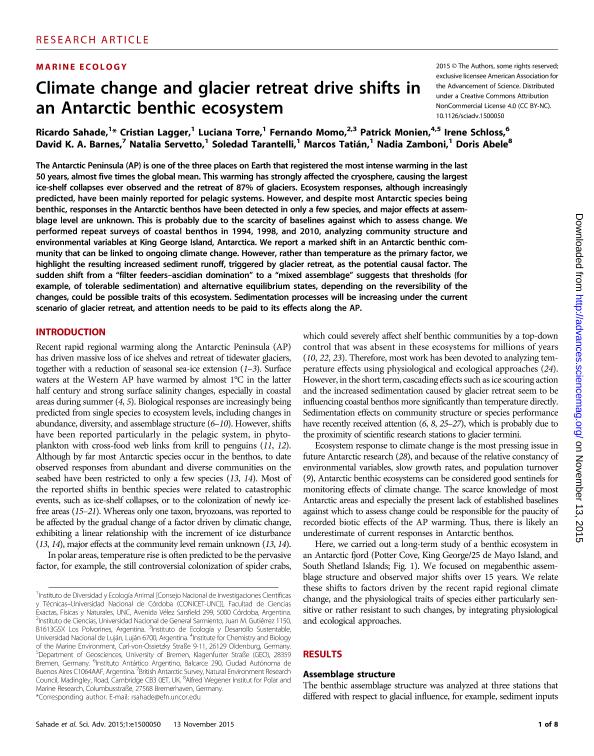Mostrar el registro sencillo del ítem
dc.contributor.author
Sahade, Ricardo Jose

dc.contributor.author
Lagger, Cristian Fabian

dc.contributor.author
Torre, Luciana

dc.contributor.author
Momo, Fernando
dc.contributor.author
Monien, Patrick
dc.contributor.author
Schloss, Irene Ruth

dc.contributor.author
Barnes, David K. A.
dc.contributor.author
Servetto, Natalia

dc.contributor.author
Tarantelli, Soledad
dc.contributor.author
Tatian, Marcos

dc.contributor.author
Zamboni, Nadia
dc.contributor.author
Abele, Doris
dc.date.available
2016-11-03T16:00:56Z
dc.date.issued
2015-11
dc.identifier.citation
Sahade, Ricardo Jose; Lagger, Cristian Fabian; Torre, Luciana; Momo, Fernando; Monien, Patrick; et al.; Climate change and glacier retreat drive shifts in an Antarctic benthic ecosystem; AAAS; Science Advances; 1; 10; 11-2015; 1-8
dc.identifier.issn
2375-2548
dc.identifier.uri
http://hdl.handle.net/11336/7934
dc.description.abstract
The Antarctic Peninsula (AP) is one of the three places on Earth that registered the most intense warming in the last 50 years, almost five times the global mean. This warming has strongly affected the cryosphere, causing the largest ice-shelf collapses ever observed and the retreat of 87% of glaciers. Ecosystem responses, although increasingly predicted, have been mainly reported for pelagic systems. However, and despite most Antarctic species being benthic, responses in the Antarctic benthos have been detected in only a few species, and major effects at assemblage level are unknown. This is probably due to the scarcity of baselines against which to assess change. We performed repeat surveys of coastal benthos in 1994, 1998, and 2010, analyzing community structure and environmental variables at King George Island, Antarctica. We report a marked shift in an Antarctic benthic community that can be linked to ongoing climate change. However, rather than temperature as the primary factor, we highlight the resulting increased sediment runoff, triggered by glacier retreat, as the potential causal factor. The sudden shift from a ?filter feeders?ascidian domination? to a ?mixed assemblage? suggests that thresholds (for example, of tolerable sedimentation) and alternative equilibrium states, depending on the reversibility of the changes, could be possible traits of this ecosystem. Sedimentation processes will be increasing under the current scenario of glacier retreat, and attention needs to be paid to its effects along the AP.
dc.format
application/pdf
dc.language.iso
eng
dc.publisher
AAAS
dc.rights
info:eu-repo/semantics/openAccess
dc.rights.uri
https://creativecommons.org/licenses/by-nc/2.5/ar/
dc.subject
Antarctica
dc.subject
Climatic Change
dc.subject
Glacier Retreat
dc.subject
Benthic Community
dc.subject.classification
Ecología

dc.subject.classification
Ciencias Biológicas

dc.subject.classification
CIENCIAS NATURALES Y EXACTAS

dc.title
Climate change and glacier retreat drive shifts in an Antarctic benthic ecosystem
dc.type
info:eu-repo/semantics/article
dc.type
info:ar-repo/semantics/artículo
dc.type
info:eu-repo/semantics/publishedVersion
dc.date.updated
2016-11-02T18:15:37Z
dc.journal.volume
1
dc.journal.number
10
dc.journal.pagination
1-8
dc.journal.pais
Estados Unidos

dc.journal.ciudad
Nueva York
dc.description.fil
Fil: Sahade, Ricardo Jose. Consejo Nacional de Investigaciones Cientificas y Tecnicas. Centro Cientifico Tecnologico Cordoba. Instituto de Diversidad y Ecologia Animal; Argentina
dc.description.fil
Fil: Lagger, Cristian Fabian. Consejo Nacional de Investigaciones Cientificas y Tecnicas. Centro Cientifico Tecnologico Cordoba. Instituto de Diversidad y Ecologia Animal; Argentina
dc.description.fil
Fil: Torre, Luciana. Consejo Nacional de Investigaciones Cientificas y Tecnicas. Centro Cientifico Tecnologico Cordoba. Instituto de Diversidad y Ecologia Animal; Argentina
dc.description.fil
Fil: Momo, Fernando. Universidad Nacional de General Sarmiento. Instituto de Ciencias; Argentina. Universidad Nacional de Lujan. Instituto de Ecologia y Desarrollo Sustentable; Argentina
dc.description.fil
Fil: Monien, Patrick. Institute for Chemistry and Biology of the Marine Environment; Alemania. Universitat Bremen; Alemania
dc.description.fil
Fil: Schloss, Irene Ruth. Ministerio de Relaciones Exteriores, Comercio Interno y Culto. Dirección Nacional del Antártico. Instituto Antártico Argentino; Argentina
dc.description.fil
Fil: Barnes, David K. A.. British Antarctic Survey; Reino Unido
dc.description.fil
Fil: Servetto, Natalia. Consejo Nacional de Investigaciones Cientificas y Tecnicas. Centro Cientifico Tecnologico Cordoba. Instituto de Diversidad y Ecologia Animal; Argentina
dc.description.fil
Fil: Tarantelli, Soledad. Universidad Nacional de Cordoba. Facultad de Cs.exactas Fisicas y Naturales. Departamento de Diversidad Biologica y Ecologica. Cat.de Ecologia Marina; Argentina
dc.description.fil
Fil: Tatian, Marcos. Consejo Nacional de Investigaciones Cientificas y Tecnicas. Centro Cientifico Tecnologico Cordoba. Instituto de Diversidad y Ecologia Animal; Argentina
dc.description.fil
Fil: Zamboni, Nadia. Consejo Nacional de Investigaciones Cientificas y Tecnicas. Centro Cientifico Tecnologico Cordoba. Instituto de Diversidad y Ecologia Animal; Argentina
dc.description.fil
Fil: Abele, Doris. Alfred Wegener Institute; Alemania
dc.journal.title
Science Advances
dc.relation.alternativeid
info:eu-repo/semantics/altIdentifier/url/http://advances.sciencemag.org/content/1/10/e1500050
dc.relation.alternativeid
info:eu-repo/semantics/altIdentifier/doi/http://dx.doi.org/10.1126/sciadv.1500050
Archivos asociados
